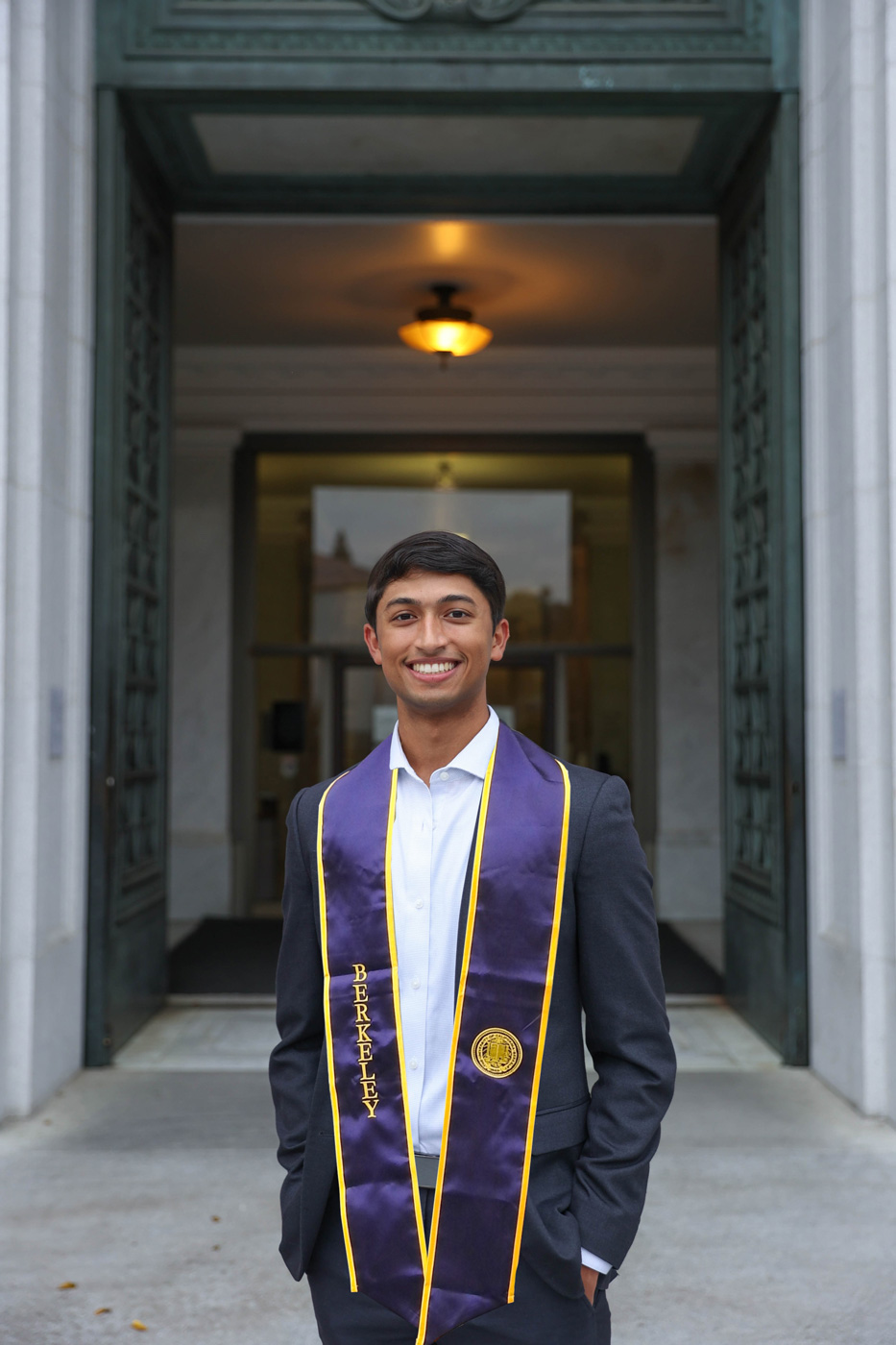
Abi Shiva
Despite starting college at the height of the COVID-19 pandemic, Abi Shiva made the most of his UC Berkeley experience.
The Environmental Sciences and Legal Studies graduate attended lectures from global leaders, learned from faculty at the leading edge of their fields, and has built professional and social relationships through the Cal Mock Trial Team and BEACN, Berkeley's Environmental Consulting Group. All of this was possible, he said, because of UC Berkeley’s unique blend of people, place, and programs.
“We’re surrounded by Silicon Valley and the Bay Area, a place where the desire to address our environmental and social challenges is baked in with rapid technological innovation,” he said. “What that means is that UC Berkeley is a hub for incredibly driven people who care a lot about this planet and want to leave it better than how they found it.”
On Monday, Shiva addressed his family, classmates, and the Rausser College of Natural Resources community from the stage at the Greek Theater as the College’s 2024 student commencement speaker. There, he implored his classmates to be a positive force for the planet and never stop learning.
Rausser College spoke to Shiva about his time at Berkeley ahead of his speech, which you can watch below.
This conversation has been edited for length and clarity.
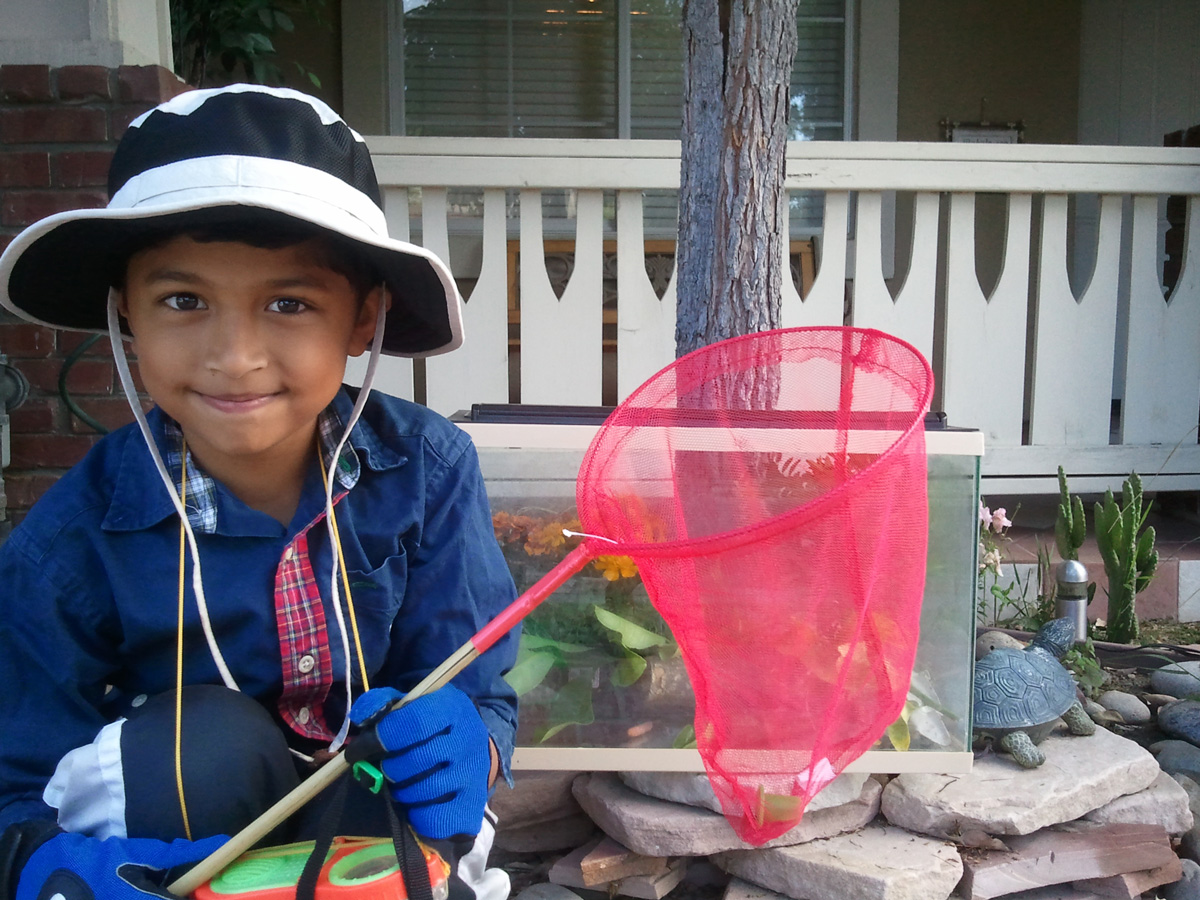
Abi Shiva as a child.
Why did you choose Rausser College?
I was born and raised in Fremont and came to Cal Day for the first time when my sister was accepted to Berkeley. I also came for debate tournaments while I was in high school. So, I’ve had opportunities to experience the spirit, excitement, and culture of the campus—it's always been an institution that I look up to. My environmental interests developed from a young age. During my elementary school years, I earned the nickname "Bug Boy," since I was always passionate about observing and collecting insects during recess with my friends. I also frequently spent my weekends on camping and hiking trips with my Boy Scout troop, and for my Eagle Scout Project, I designed and built a series of educational placards on pollinator species for a local ecological center. Hence, when I was accepted to Berkeley, I knew this would be the best place to turn my environmental interests into meaningful impact on a larger scale.
Was it difficult navigating your first few years during the COVID-19 pandemic?
The pandemic was naturally tough on a lot of people. There were lots of restrictions on campus, in the dining halls, and across the dorms on top of scares, outbreaks, and cases where people on your floors came down with COVID. But I think a lot of us made the most of it. People still had a fun, rewarding, memorable college experience in a safe way. While there were a lot of challenges that came out of that moment, we also learned a lot about the importance of maintaining interpersonal connections and trusting our public institutions.
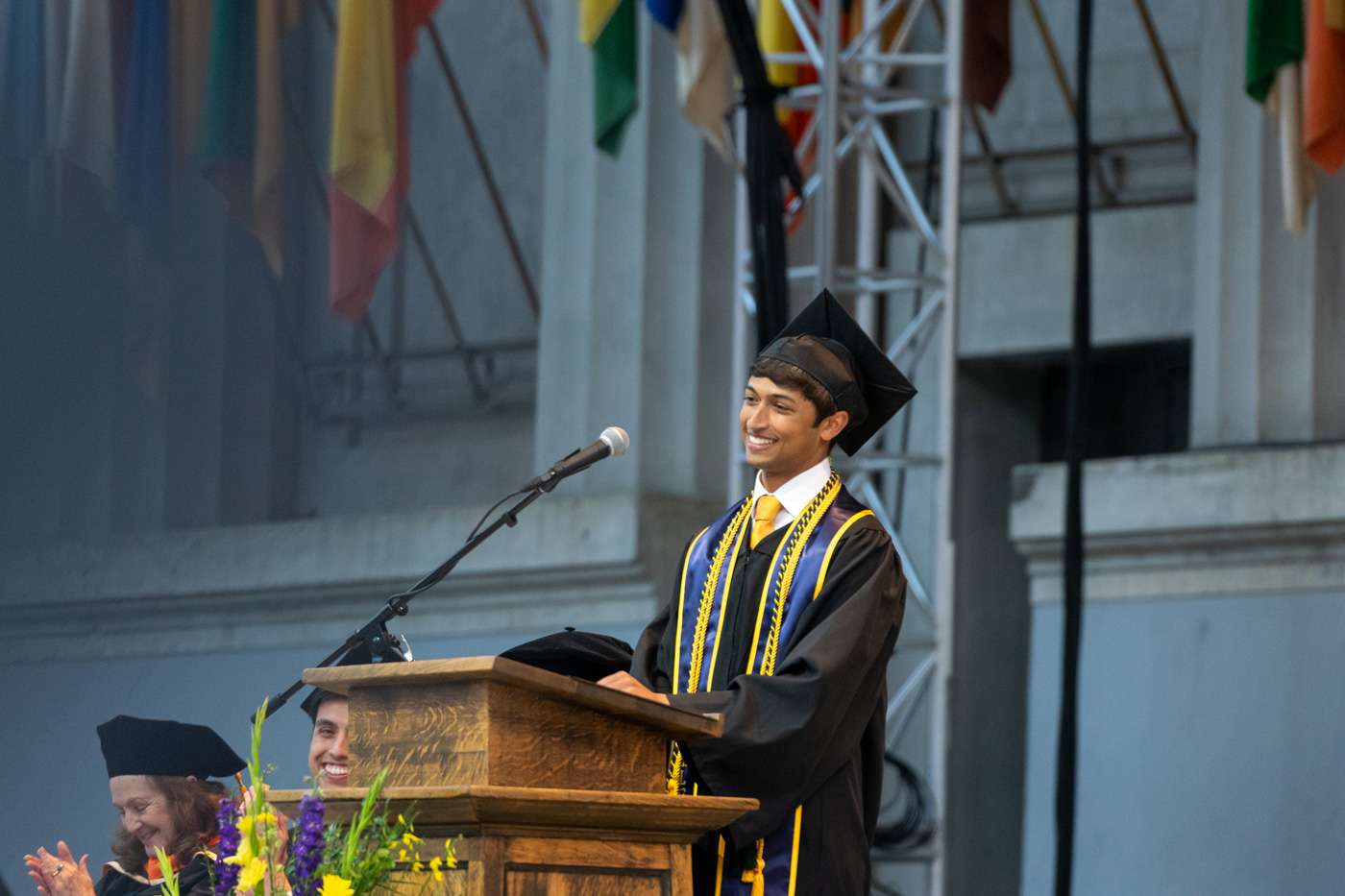
Shiva at the 2024 Rausser College commencement. Photo by Mathew Burciaga
When things did return to normal after the peak pandemic ended, it felt like people of multiple years were all starting at the same level. I think that broke down a lot of barriers and expanded the possibility of who you can be friends with. Everyone—whether you were a freshman, sophomore, junior, or senior—came in looking to make connections. Friendships didn’t feel as set as they typically are, which showed how much people really valued those interpersonal relationships.
What classes did you enjoy most?
The Environmental Science major offered a fantastic breadth of courses. After finishing my lower-division STEM classes and getting those core environmental science skills down, I had a lot of latitude to explore fields like energy, law, policy, and data science. That led me to add on a Legal Studies major because I wanted to dive a little bit deeper into the legal field once law school became more of a choice for me. Those classes helped me hone my writing and critical thinking skills.
I really enjoyed learning from Professor Dara O'Rourke, who was a senior scientist at Amazon. He taught the sustainable industry class but is all around a great instructor, incredibly collaborative, and very willing to help people get jobs. I also had the opportunity to learn about the U.S. Supreme Court and public policy from Berkeley Law Dean Erwin Chemerinsky. There have been a lot of landmark decisions over the past four years, so it was interesting to hear from someone who is a leading legal scholar and has argued in front of the Supreme Court. I also just presented my senior research thesis, which was a pretty big chunk of my college experience. It was great to share different ideas, work with my peers over the course of three semesters, and produce a final thesis on the intersection of private equity and climate-aligned investing.
How did you spend your time outside of class?
I was captain of my high school debate team and was very involved in that community, so when I came to Berkeley, I knew that I wanted to join either the Debate or Mock Trial teams. To get the best of both worlds, I joined the Cal Mock Trial Team and started coaching debate at Berkeley High School. The Mock Trial team members and coaches were incredible, but what really sold me was how competitively successful they are. I stepped back from Mock Trial once I got more involved with BEACN, Berkeley’s environmental consulting group.
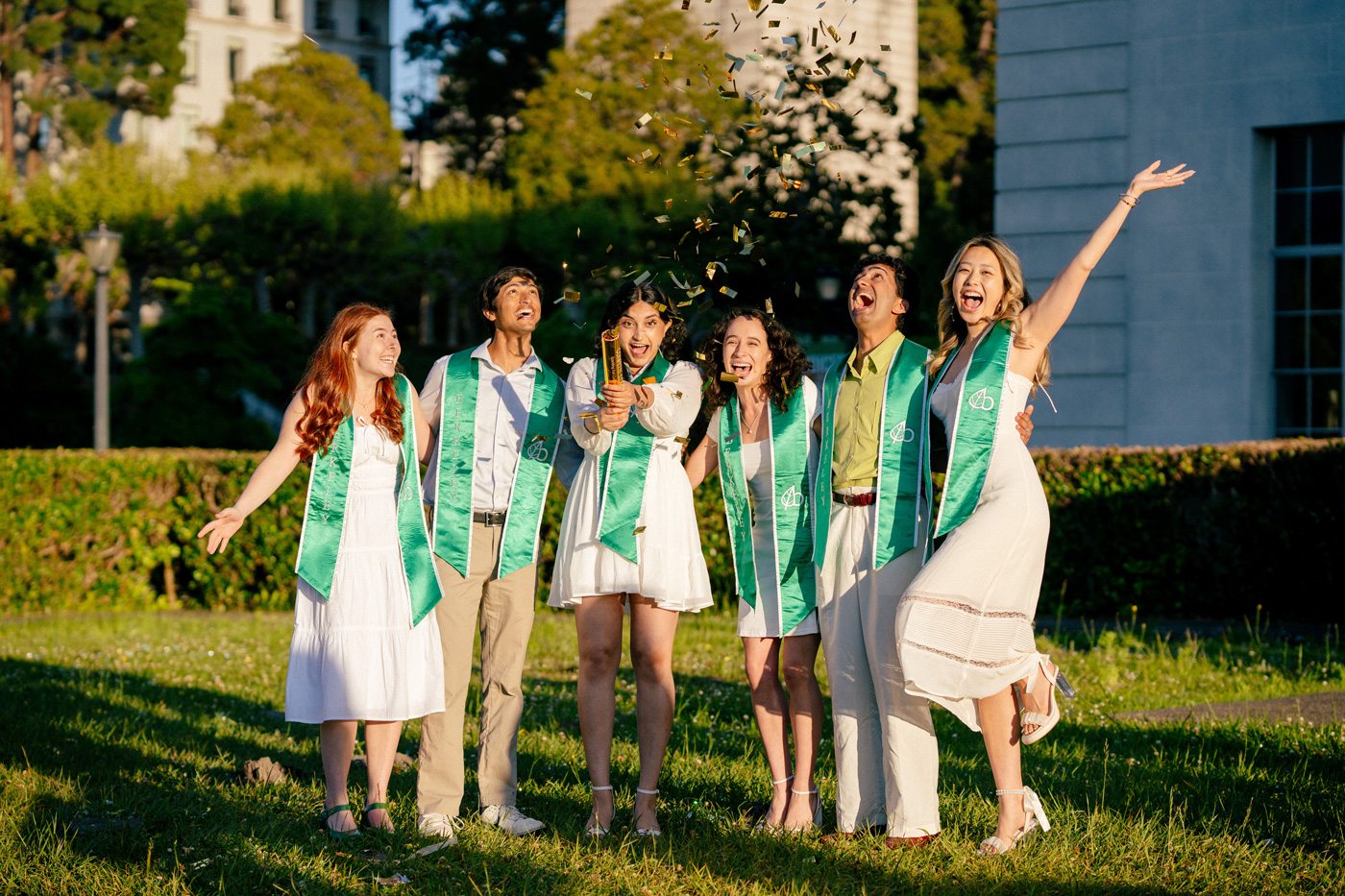
Shiva and other BEACN members celebrate their graduation.
Berkeley is known for having so many undergraduate consulting groups. They provide great opportunities for professional development and have a really great culture and community. I joined BEACN during my freshman year and it was a life-changing experience. I've been a consultant for startups and nonprofits, and have led projects for Dell, Intel, and Tiffany & Co. I most recently served as president, which at times felt like I was playing student CEO. I managed a talented team of 50 students working on five projects and directed a lot of our funding toward professional development, social events, donations to charity, and opportunity scholarships we give back to our students. I’m also still overseeing a big partnership with the Union of Concerned Scientists, which is a group I’ve always looked up to for their climate litigation work and scientific advocacy on a range of environmental and social issues.
Getting involved with BEACN is one of my defining Berkeley experiences. It’s provided me with great real-world experience but I’ve also met some of my closest friends through it. Leading an organization like this has shown me that wanting to make a lot of money by working with big or flashy clients can be harmful to the student culture. This past year, we’ve really tried to shift our focus back to promoting a healthy culture and making a positive impact.
What do you plan to do after graduation?
Right now, I’m planning to spend half a year traveling, working on things I care about, and also taking a break. This summer, I plan to work on a few research projects while I am at the University of Oxford, focusing on international environmental law issues. I also plan to go to Sri Lanka, which is where my parents are from. It's a beautiful country that I’ve visited a few times, but I've always wanted to stay for an extended period of time. Sri Lanka is home to some of the frontlines of our toughest environmental challenges because it’s very susceptible to tsunamis, rising sea level, mangrove depletion, and other things. I hope to do some on-the-ground conservation work while I’m there, which is very much needed and an experience that I haven't had yet. While I’m excited for the opportunity, I’m also looking forward to immersing myself in a culture that my parents have very much instilled in me since I was young.
What memories will you take with you?
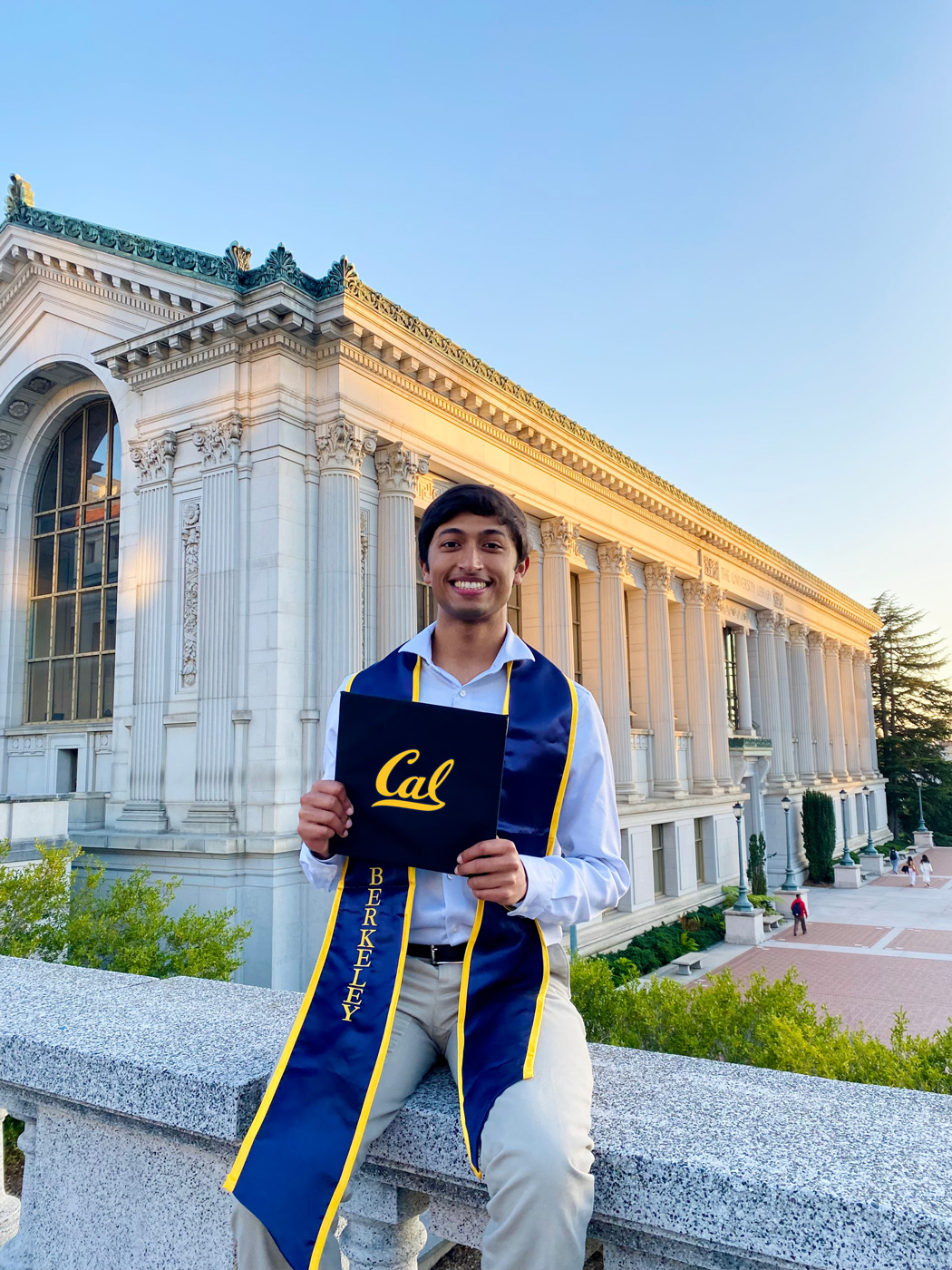
Lately, I’ve been reminding myself of three things. The first is how incredible our educational experience has been. It’s not something I realized until I came here, but UC Berkeley is an institution with strong credibility across so many fields. I got to attend talks by speakers from around the world and work with leading organizations in business and tech, all because they understand the incredible education UC Berkeley offers its students. This experience is going to last a lifetime.
The second is that Rausser College—and the community that we've built—is a great place within a truly unique institution. Students who come to UC Berkeley might change their majors and minors, but what is incredible about Rausser College is that, regardless of what major you go into, you get a very well-rounded breadth of education. We are exposed to such a variety of classes from energy systems to climate technologies to environmental data science—it’s truly a unique experience.
Lastly, through all this, I think it’s important to remember that we have to leverage our education to better the planet as well as the communities that make it up. Climate change and other environmental challenges that our world faces are not going away. Progress is being made, which is great, but it's our job as incoming climate and environmental leaders to accelerate that progress. Even though we have a lot of work in front of us, we’ve received an incredible education and built strong networks that we can use to better our planet for everyone.
